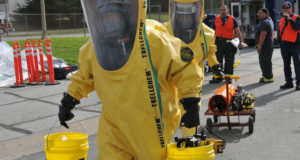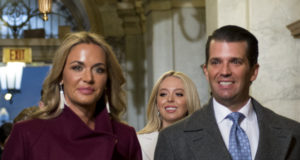In the spring of 2012, Donald Trump’s two eldest children, Ivanka Trump and Donald Trump Jr., found themselves in a precarious legal position. For two years, prosecutors in the Manhattan District Attorney’s office had been building a criminal case against them for misleading prospective buyers of units in the Trump SoHo, a hotel and condo development that was failing to sell. Despite the best efforts of the siblings’ defense team, the case had not gone away. An indictment seemed like a real possibility. The evidence included emails from the Trumps making clear that they were aware they were using inflated figures about how well the condos were selling to lure buyers.
The Trump SoHo was beleaguered from the start: Named for one of Manhattan’s trendiest neighborhoods, the development wasn’t really in SoHo, but located just west of it, near the entrance ramp to the Holland Tunnel. Zoning laws wouldn’t allow a residential tower at the location, so the Trumps fell back on an alternative: a “condo-hotel,” in which buyers got a hotel room rather than an apartment, and were legally prohibited from staying there more than 120 nights per year. Worse, the high-priced condos hit the market in September 2007, just as the global economy began to crater in what became the largest financial crisis since the Great Depression.
Business was slow, but the Trump family claimed the opposite. In April 2008, they said that 31 percent of the condos in the building had been purchased. Donald Jr. boasted to The Real Deal magazine that 55 percent of the units had been bought. In June 2008, Donald Jr. and Ivanka, alongside their brother Eric, gathered the foreign press at Trump Tower in Manhattan, where Ivanka announced that 60 percent had been snapped up. “We’re in a very fortunate position,” she said, “where we have enough sales and now we are strategically targeting certain buyers.”
None of that was true. According to a sworn affidavit by a Trump partner filed with the New York attorney general’s office, by March of 2010, almost two years after the press conference, only 15.8 percent of units had been sold.
This was more than a marketing problem. The deal hinged on selling at least 15 percent of the units. By law, the sales couldn’t close with anything less. The Trumps and their partners would have had to return the buyers’ down payments.
Some buyers concluded that they’d been cheated. In August 2010, some sued the Trump Organization and others involved in the project in New York federal court. “This action seeks to redress the substantial and ongoing pattern of fraudulent misrepresentations and deceptive sales practices” by the Trumps and the other defendants, the suit charged. The plaintiffs argued that there’s a vast difference in value between a unit in a building that is 15 percent sold and one that is 60 percent sold. Their complaint accused the sellers, including the Trumps, of “a consistent and concerted pattern of outright lies.”
In one email, according to four people who have seen it, the Trumps discussed how to coordinate false information they had given to prospective buyers. In another, according to a person who read the emails, they worried that a reporter might be onto them. In yet another, Donald Jr. spoke reassuringly to a broker who was concerned about the false statements, saying that nobody would ever find out, because only people on the email chain or in the Trump Organization knew about the deception, according to a person who saw the email.
There was “no doubt” that the Trump children “approved, knew of, agreed to, and intentionally inflated the numbers to make more sales,” one person who saw the emails told us. “They knew it was wrong.”
In 2010, when the Major Economic Crimes Bureau of the D.A.’s office opened an investigation of the siblings, the Trump Organization had hired several top New York criminal defense lawyers to represent Donald Jr. and Ivanka. These attorneys had met with prosecutors in the bureau several times. They conceded that their clients had made exaggerated claims, but argued that the overstatements didn’t amount to criminal misconduct. Still, the case dragged on. In a meeting with the defense team, Donald Trump, Sr., expressed frustration that the investigation had not been closed. Soon after, his longtime personal lawyer, Marc Kasowitz entered the case.
Kasowitz, who by then had been the elder Donald Trump’s attorney for a decade, is primarily a civil litigator with little experience in criminal matters. But in 2012, Kasowitz donated $25,000 to the reelection campaign of Manhattan District Attorney Cyrus Vance Jr., making Kasowitz one of Vance’s largest donors. Kasowitz decided to bypass the lower level prosecutors and went directly to Vance to ask that the investigation be dropped.
On May 16, 2012, Kasowitz visited Vance’s office at One Hogan Place in downtown Manhattan — a faded edifice made famous by the television show, “Law & Order.” Dan Alonso, the chief assistant district attorney, and Adam Kaufmann, the chief of the investigative division, were also at the meeting, but no one from the Major Economic Crimes Bureau attended. Kasowitz did not introduce any new arguments or facts during his session. He simply repeated the arguments that the other defense lawyers had been making for months.
Ultimately, Vance overruled his own prosecutors. Three months after the meeting, he told them to drop the case. Kasowitz subsequently boasted to colleagues about representing the Trump children, according to two people. He said that the case was “really dangerous,” one person said, and that it was “amazing I got them off.” (Kasowitz denied making such a statement.)
Vance defended his decision. “I did not at the time believe beyond a reasonable doubt that a crime had been committed,” he told us. “I had to make a call and I made the call, and I think I made the right call.”
Just before the 2012 meeting, Vance’s campaign had returned Kasowitz’s $25,000 contribution, in keeping with what Vance describes as standard practice when a donor has a case before his office. Kasowitz “had no influence and his contributions had no influence whatsoever on my decision-making in the case,” Vance said.
But less than six months after the D.A.’s office dropped the case, Kasowitz made an even larger donation to Vance’s campaign, and helped raise more from others — eventually, a total of more than $50,000. After being asked about these donations as part of the reporting for this article — more than four years after the fact — Vance said he now plans to give back Kasowitz’s second contribution, too. “I don’t want the money to be a millstone around anybody’s neck, including the office’s,” he said.
Kasowitz told us his donations to Vance were unrelated to the case. “I donated to Cy Vance’s campaign because I was and remain extremely impressed by him as a person of impeccable integrity, as a brilliant lawyer and as a public servant with creative ideas and tremendous ability,” Kasowitz wrote in an emailed statement. “I have never made a contribution to anyone’s campaign, including Cy Vance’s, as a ‘quid-pro-quo’ for anything.”
Last year, The New York Times reported the existence of the criminal investigation into the Trump SoHo project. But the prosecutor’s focus on Ivanka and Donald Jr. and the email evidence against them, as well as Kasowitz’s involvement, and Vance’s decision to overrule his prosecutors, had not been previously made public. This account is based on interviews with 20 sources familiar with the investigation, court records, and other public documents. We were not able to review copies of the emails that were the focal point of the inquiry. We are relying on the accounts of multiple individuals who have seen them.
Written by ProPublica
Tweet




